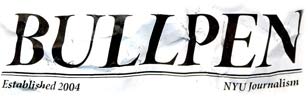Lecture: Katrina vanden Heuvel

Photo courtesy of the Jules Stein Eye Institute. Copyright 2006, Jsei.org.
RELATED:
It will come as news to the conservatives who vilify it as the house organ of neo-Marxists and Bush-bashers, but The Nation can’t be categorized as a liberal magazine—at least, not according to Katrina vanden Heuvel. As editor-in-chief, vanden Heuvel cleaves to the mission outlined in the magazine’s 1865 prospectus, which states “[The Nation] will not be the organ of any party, sect, or body,” but instead “make an earnest effort to bring to the discussion of political and social questions a really critical spirit.” On Thursday, April 6, 2006, vanden Heuvel spoke to the 40-odd students in NYU Professor Mark Dery’s undergraduate lecture class “Introduction to Media Criticism,” at The Nation’s offices in Manhattan’s Gramercy Park neighborhood, about the challenges of running a fiercely independent magazine in the age of corporate mergers and what Nation media columnist Eric Alterman calls the Bush administration’s “war on the press.”
While she shares the same values as the founders of the 141-year-old news weekly, vanden Heuvel has decidedly modern sensibilities. When she joined The Nation in 1989, she was quick to embrace television as a means of disseminating the magazine’s dissident message. For 17-years, vanden Heuvel has been a regular on television talk shows such as Larry King Live, Hardball with Chris Matthews, and The O’Reilly Factor. Debating issues raised by stories in The Nation, she brings a (rare) progressive voice to the national debate and, it should be said, attempts to generate interest in the magazine among a broad spectrum of viewers—a task that doesn’t come naturally to vanden Heuvel, who claims she has “never been good at [delivering] the soundbite.”
Vanden Heuvel acknowledges the effectiveness of television, but she remains wary of the light-on-the-facts, heavy-on-the-ad-hominem style that characterizes too many political debates on TV. “Without backup material, [soundbites can be] explosive and sensationalistic,” she said. Despite this (or, perhaps, because of it), soundbite-heavy cable news shows, such as Hardball with Chris Matthews and Lou Dobbs Tonight, have become “signature shows,” she said. Many Americans are choosing cable’s news digest programs over network shows like The CBS Evening News, according to vanden Heuvel. Given this trend, the soundbite-driven cable-news model will continue to reign supreme, she predicts. While vanden Heuvel is willing to capitalize on this trend, she wonders what people are really learning from news diets consisting of “10 minutes of radio or 10 minutes of cable.”
Nonetheless, vanden Heuvel is willing to use all the tools at her disposal to put “[progressive issues] on the agenda.” The editor-in-chief and publisher of The Nation takes evident pride in running a magazine that defends the values of its activists. In addition to a weekly newsmagazine, The Nation publishes a classroom guide designed to help high school and college students put the news in context. “History is to a country what memory is to an individual,” vanden Heuvel said. “I think it’s important to remind people where things come from.” For instance, vanden Heuvel’s idea for an upcoming Nation classroom supplement includes using the recent discovery of a fossil, which scientists believe provides the missing link between fish and land animals, as a jumping off point to discuss the 1925 Scopes “monkey trial.” The seminal 1925 trial, which attempted to overturn a Tennessee law forbidding the teaching of evolution in public schools, is essential to our understanding of the current debate about evolutionary theory, she says.
Vanden Heuvel’s editorial philosophy runs counter to conventional wisdom. Most editors believe retaining readers requires a relentless focus on what’s trendy, hip, or “of the moment.” vanden Heuvel proves popular by merely showcasing stories with a socially responsible message. Why? “You know, I go back to the turn of the century,” she told the crowd of aspiring journalists. “There was a generation of muckrakers, people like Ida Tarbell, Upton Sinclair, [and] Lincoln Steffens…who did not do very sexy reporting.” According to vanden Heuvel, they did something more important: they exposed abuses of power. Muckrakers were committed to defending democratic ideals and promoting social activism, she said, a mission shared by The Nation.
Vanden Heuvel went on to discuss the prevailing view that patriotism consists of not questioning the sitting President. “Many media institutions…fear being called un-American [or] un-patriotic,” she said. In her view, too many media outlets equate complicity with patriotism. She cited as evidence U.S. coverage of the run-up to the war in Iraq. “Two years ago, when it was clear the administration was lying about the links between 9/11 and Iraq,” she asked, “why wasn’t [a blunt question] asked at a White House press conference, [such as] ‘What is your evidence?’”
Lately, vanden Heuvel suggested, mainstream journalism seems to be growing a spine. There’s a little more life in the media,” she said. “It’s almost become trendy…to be tough on Bush.” And not a minute too soon, in her opinion. “A courageous press is the oxygen of democracy,” she said. “And a flawed media leads to a flawed democracy.” Vanden Heuvel encouraged the students around the table to pursue a career in journalism despite her misgivings about the modern media. “We need a new generation of muckrakers…so that you have a country you can be proud of,” she said. “That’s my idea of patriotism.

